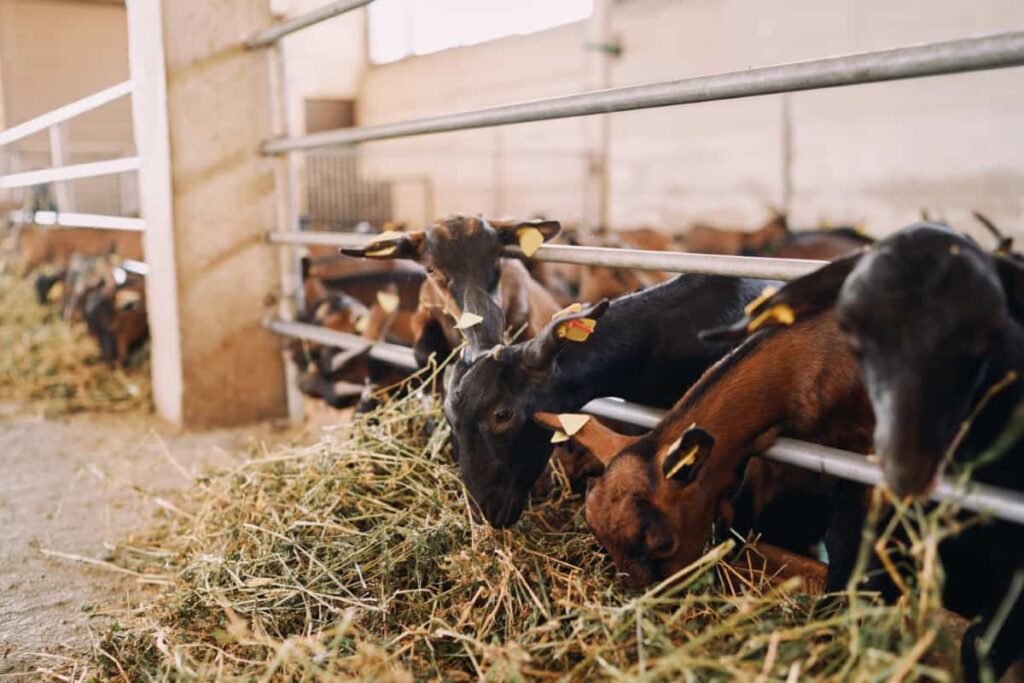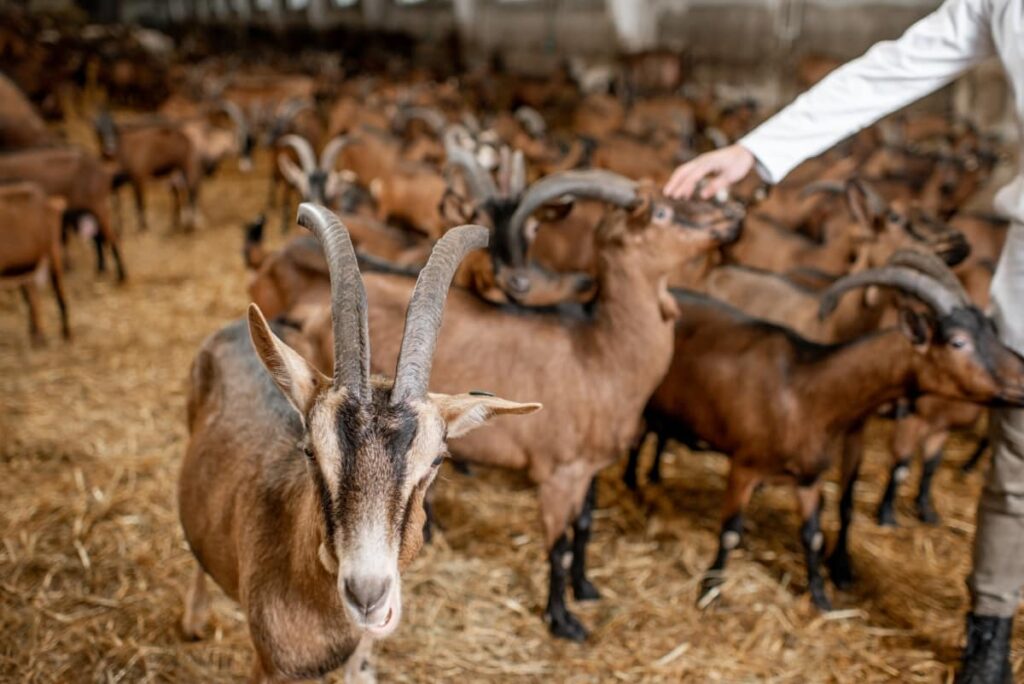Goats are fascinating creatures known for their hardy nature and unique personalities. These intruders can impact the health and well-being of your goats if left unchecked. Parasites are a persistent threat to the health and productivity of goats. Managing parasites in goats is crucial for maintaining their overall well-being.

Managing Parasites in Goats
Common Parasites Affecting Goats
The most common internal parasites in goats are lungworms, stomach worms, liver flukes, and intestinal parasites, the most common of which are coccidia. These pesky creatures can wreak havoc on a goat’s health if left unchecked. Lungworms, as their name suggests, reside in the lungs and can cause respiratory distress.
Stomach worms, on the other hand, take up residence in the abomasum or fourth stomach of goats, leading to poor digestion and weight loss. Liver flukes are another concern for goat owners as they infest the liver and can cause damage to this vital organ. Intestinal parasites such as coccidia affect the lining of the intestines, causing diarrhea and nutrient absorption issues.
Regular monitoring is crucial in identifying goat parasites early on so that proper treatment can be implemented promptly. Preventing parasite infestation is always preferable to treating it later. Implementing preventive measures such as pasture rotation, proper sanitation practices, and providing adequate nutrition to boost immune function are all essential strategies.
Importance of Regular Health Checks and Monitoring
Regular health checks and monitoring are essential for maintaining the overall well-being of your goats. By conducting regular check-ups, you can detect any signs of illness or parasite infestation early on and take prompt action to prevent further complications.
During these health checks, it is important to assess the general body condition of your goats, looking for any abnormal weight loss or gain, signs of dehydration, or changes in behavior. This can help identify potential underlying health issues that may need immediate attention. Monitoring also involves observing the goat’s behavior and appetite daily.
Implementing Preventive Measures Against Parasites
By taking proactive measures, you can significantly reduce the risk of parasite infestation and ensure the overall health and well-being of your goat herd. An important preventive measure is maintaining a clean and sanitary living environment for your goats. Regularly cleaning their pens or pastures helps eliminate potential breeding grounds for parasites.
In case you missed it: Integrating Goats into Sustainable Farming Systems

Another effective strategy is strategic deworming. Working with a veterinarian, develop a deworming schedule that aligns with the specific needs of your goats and the prevalence of parasites in your area. Additionally, promoting good nutritional practices plays a crucial role in preventing parasitic infections in goats. Ensuring goats have access to high-quality forage and balanced diets strengthens their immune systems, making them more resistant to parasites. Regular monitoring of your goat herd is essential too.
Choosing the Right Dewormer for Goats
There are several factors to consider before making your selection. Firstly, consult with a veterinarian to find the specific types of parasites affecting your goats. This will help determine which dewormer will be most effective. Different dewormers target different parasites, so it’s important to choose one that addresses the specific issues at hand.
Some products may even offer broad-spectrum coverage against multiple types of parasites, providing comprehensive protection for your herd. Consider the administration method as well. Dewormers come in various forms, such as oral drenches or injections. Choose a method that suits both your and your goats’ preferences and needs. Keep in mind that resistance can develop over time if a single type of dewormer is used repeatedly.
Managing External Parasites in Goats
From lice and ticks to mites and fleas, external parasites can wreak havoc on a goat’s health and well-being. The most effective way to manage external parasites in goats is through regular grooming and inspection. By thoroughly examining your goats’ coats for any signs of infestation, you can catch potential problems early on.
Another important aspect of managing external parasites is implementing preventive measures. In severe cases of infestation, it may be necessary to use topical treatments or medications prescribed by a veterinarian. These products are formulated to kill or repel external parasites while minimizing any potential harm to the goat. Furthermore, maintaining proper sanitation practices within your goat’s living environment plays a crucial role in managing external parasites in goats.
Biosecurity Measures to Prevent Parasite Spread
These measures are important to prevent the spread of parasites in goats and protect your goat herd from infestations. The important aspect of biosecurity is quarantine. Any new animals brought onto your farm should be quarantined for some time before being introduced to the rest of the herd. This allows you to monitor their health and check for any signs of parasites.
Another vital step is maintaining a clean environment. Additionally, practicing good pasture management, such as rotational grazing and proper manure disposal, can minimize parasite exposure. Proper fencing also plays a significant role in preventing parasite spread. Practicing strict hygiene protocols when handling or treating goats is essential.
Role of Goat Breed and Genetics in Parasite Resistance
Different goat breeds have varying levels of resistance to parasites, making some more susceptible than others. Their genetic makeup largely determines this resistance. Certain goat breeds have developed natural defenses against common parasites, allowing them to better tolerate infestations without showing severe symptoms. These resistant breeds can serve as valuable assets for farmers looking to reduce parasite burdens within their herds.
In case you missed it: Mineral Supplementation in Goat Diets: Meeting Nutritional Requirements

Breeding programs focused on selecting parasite-resistant genetics are becoming increasingly popular among goat farmers. Goat owners need to research different breeds and understand their respective levels of parasite resistance. Some goats may still be more susceptible than others, even within a resistant breed. Regular health checks and monitoring are crucial for identifying these individuals early on so appropriate measures can be taken.
Environmental Factors Affecting Parasite Prevalence
Climate plays a significant role in parasite development and survival. Warm and humid environments provide favorable conditions for parasites to thrive. These conditions allow eggs and larvae to survive longer outside the host’s body, increasing the risk of infection.
Pasture management practices are essential in controlling parasite populations. Overgrazing can lead to a buildup of parasites as goats continuously graze on contaminated vegetation. Rotational grazing and proper pasture sanitation help reduce exposure by allowing pastures time to rest and recover from contamination. Furthermore, farm hygiene practices also play a vital role in preventing parasitic infections.
Integrating Traditional and Alternative Treatments
Traditional treatments such as chemical dewormers have been proven over time to control parasite infestations effectively. These products are readily available, easy to administer, and provide quick results. However, their repeated use may lead to the development of resistance in parasites. To address this concern, many goat owners are exploring alternative treatments that focus on boosting the goat’s immune system and creating an inhospitable environment for parasites.
Natural remedies like herbal supplements or diatomaceous earth can be incorporated into a holistic parasite management plan. Additionally, probiotics and other natural supplements can promote a healthy gut flora balance while supporting overall immunity. It is important to note that while alternative treatments hold promise for managing parasites in goats naturally, they should not replace regular monitoring or preventive measures. A veterinarian’s guidance is crucial when integrating these methods into your goat management practices.
Frequently Asked Questions (FAQ) on Parasite Infestation in Goats
What are Some Common Signs of Parasite Infestation in Goats?
Keep a vigilant eye out for symptoms such as weight loss, poor appetite, rough hair coat, diarrhea, anemia, and bottle jaw. These signs may indicate a parasitic infection and should prompt further investigation.
How Do I Diagnose Parasite Issues in My Goats?
To accurately diagnose a parasite issue, you will need to perform fecal testing on your goats. Collect fresh fecal samples from multiple animals within your herd and send them off to a veterinarian or laboratory for analysis. This will help identify which types of worms or other parasites are present so that appropriate treatment measures can be taken.
What Treatments are Available for Managing Parasites in Goats?
Various medications called anthelmintics can effectively treat internal parasites in goats. However, it’s important not to rely solely on one type of medication as this can lead to drug resistance over time. Rotate between different classes of dewormers periodically based on veterinary recommendations.
Are There Any Side Effects of Using Dewormers in Goats?
When used correctly according to label instructions or veterinary guidance, most commercial dewormers are safe for use in goats without causing significant side effects.
In case you missed it: Goat Farming Business 101: Exploring Basics of Goat Farm Business

Conclusion
Parasites are a major threat to the health and well-being of goats, causing weight loss, anemia, poor growth rates, and even death if left untreated. These pesky organisms can wreak havoc on your goat’s digestive system and overall immune function. By implementing effective parasite control measures, you can ensure that your goats remain healthy and thriving.
- Types of Grass Growing for Goat Farm
- How to Train Goats for Milking: A Beginners Guide
- Goat Milking Practices and Equipment: A Beginner’s Guide
- Goat Farming for Fiber: Producing Mohair and Cashmere
- Maximizing Goat Milk Production: Tips for Dairy Goat Farmers
- Goat Farming as a Family Business: Strategies for Success
- Profitable Kenya Goat Breeds for Commercial Dairy and Meat Business
- Unlock the Secrets of Oberhasli Goat: Discover Raising and Management Practices
- Ultimate Guide to Myotonic Goats: Explore Profile to Raising